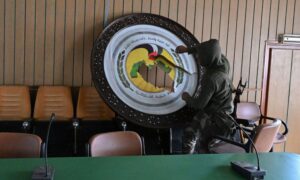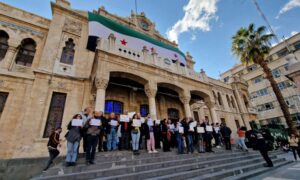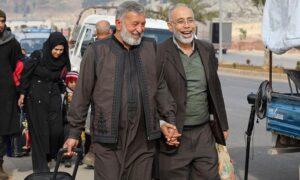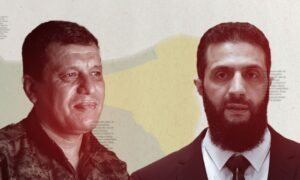For the past six years, the Syrian revolution has occupied the attention of the world, the concentrated media coverage played a prominent role in creating this global interaction; despite the fact that this coverage was basically qualitative and objective, some media outlets fueled violence and hatred between different racial and sectarian groups.
Freedom of expression is a fundamental principle provided for within the international frame of human rights; it was one of the Syrian demonstrators’ demands in 2011. However, the international law and the local regulations of democratic regimes monitor this liberty when the speech’s aim is to trigger violence only.
“Syria Justice and Accountability Center,” in a previously published report under the title “The Media’s War: How the Press is Fueling Syria’s Conflict,” observes that in spite of the eccentric international focus and its direct interest in the battlefield, the verbal war is filling the air; this must be addressed by the region’s decision makers, in addition to the futuristic accountability mechanisms.
Biased and Inflammatory Coverage
In neighboring countries and inside Syria, new media outlets mushroomed in the opposition-held regions as to give the opposition a sound. In both cases and most of the time, the coverage is biased and sometimes is quite inflammatory.
These “dynamics” do not apply to Syria exclusively, but also to Arabic-language media which incubated this conduct through their biased programmes.
According to a study by the “Columbia Journalism Review,” media outlets are not covering violence only; but rather, they are acting like militias by using hate speech to also “actively entice it.”
These practices are not limited to a single Syrian party. The parties involved in the conflict have all showed the tendency to do so, including fulling violence between Arabs and Kurds, who are two groups among other religious and sectarian denominations, leading to the demonization of the other and, in turn, the naturalization of violation, torture and killing, as long as the victim is the convicted “other.”
Many governments are aware of the harmful effects of the others’ demonization and dehumanization, accordingly, they decreed preventive procedures. For example, South Africa’s Constitution provided for “inherent dignity” as an attempt at preventing dehumanization and demonization endemic in the Apartheid regime.
How to Convince Syrians of “Reconciliation”?
Facing the current media climates, encouraging violence and dehumanization on a sectarian, racial and political basis, the “Syrian Center” proposed the following question: How can an independent Syrian government, in the future, convince all the members of the Syrian society to reconcile and collectively rebuild the establishments at the level of the state and the society in general?
The Center deems the restoration of trust as a massive challenge requiring a multiple-approaches scheme, but one of these approaches might and must be “justice.”
Going back in time in the history of media enticement, we find that propagating genocide, has turned, after “Nuremberg” Trials that were conducted in Europe after the Second World War to bring Nazi criminals to justice, into a crime punishable by international criminal law.
According to experts, genocides would not have been committed unless there was a large scale of public incitement to hatred.
Hatred has been provided for in the “Rome Statute” and the decisions of the International Criminal Tribunal for Rwanda titled as the “Media Case,” through which three Rwandan media leaders were convicted of direct and public incitement to genocide.
The Court affirmed: “The power of the media to create and destroy fundamental human values comes with great responsibility. Those who control the media are accountable for its consequences.”
Documenting Enticement is a Necessity
Even in cases where media are not placed under strict legal definitions, truth-telling efforts can still clarify how some reports and coverings contributed to the creation of an atmosphere of hate and polarization.
According to the “Syria Justice and Accountability Center,” with truth-telling, the mentioned efforts can help restore balance to the feelings of the public opinion and encourage media to play a more positive role in the post-conflict period.
Despite all that has been previously mentioned, media will be playing a fundamental role in the peace-building efforts, which the Center has specified as explaining the transition phase to the public, providing a forum to add a humanitarian dimension to the conflict via shared stories and experiences and advertising the date and the ways to register for some transitional justice programs.
The South African Broadcasting Corporation, in Africa, produced 87 episodes on the Truth and Reconciliation Commission which offered the public a valuable source on the Commissions’ progress and usefulness. Nevertheless, the positive effects would not be possible if the media would abstain from being ethical and responsible.
Enab Baladi has implemented this file in cooperation with the “Syria Justice and Accountability Center.”
if you think the article contain wrong information or you have additional details Send Correction
النسخة العربية من المقال
-
Follow us :


















 A
A
A
A
A
A








 More In-Depth
More In-Depth